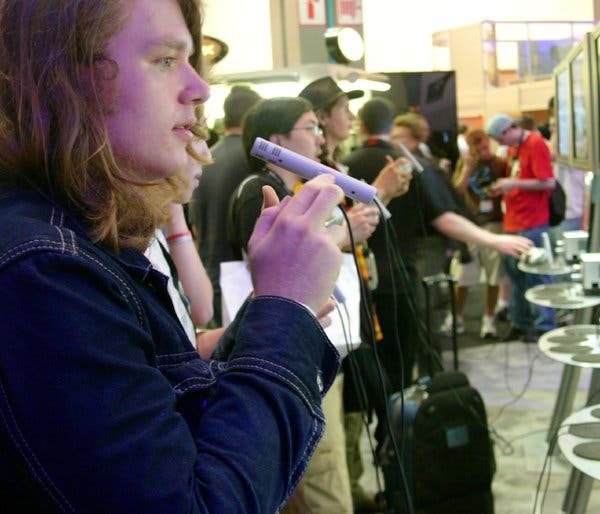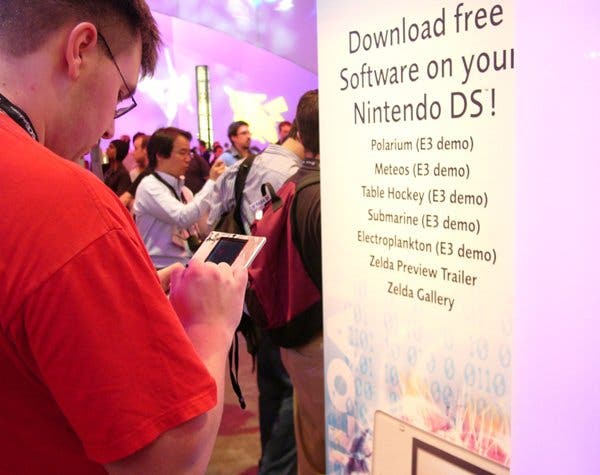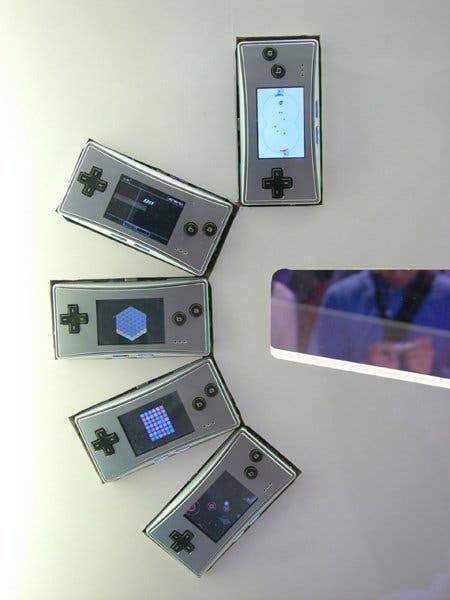Jim Merrick on Ninty's European assault
"We won't be two years late on any more games."
Europe has always been seen as the poor relation in Nintendo's global plans - but with sales of the DS in the region rapidly approaching a million units just a few short months after launch and impressive annual growth, that may not be the case for much longer. We sat down with Nintendo's head of European marketing, Jim Merrick at the E3 show in Los Angeles to find out more about the company's plans for the rest of the year in Europe - including the growth of the DS, the arrival of the Game Boy Micro, and how Christmas is shaping up for the GameCube.
We're very pleased with it. We're on about 800,000 sell-through right now and looking forward to making an announcement on our first million in the next couple of weeks. I mean, you saw all the frenzy at the launch - there's been a very good response from consumers, particularly with 400,000 units of Super Mario DS, which has sold very well for us.
Actually all of the 14 launch titles have seen very good sales, and now we're really starting to broaden that library - Need for Speed, GoldenEye, Revenge of the Sith and Splinter Cell from Ubisoft... We're broadening up that library, and then looking ahead to this fall, you have things like Nintendogs - which is, as you've probably seen in the numbers out of Japan, just doing amazingly well and really driving the hardware there. Mario Kart this fall is also going to be a no-brainer, particularly with WiFi so you have online internet play as well as the local wireless. So it's a pretty good year on the handheld side.
And of course, Game Boy Micro is an interesting twist to throw in... It's got a brilliant screen, and the whole thing's not that much bigger than a cartridge.
This fall. I don't have a fixed date yet, though.
Of course, I'd love to have a major title every month! But while one of the advantages that we had was launching with a bigger launch library, that also means that we have a little bit more of a gap post-launch because we rushed some of those games to get them into our launch library. I think NoA [Nintendo of America] was quite jealous that we were able to launch with 14 games, while they launched with, well, basically three before the end of Christmas.
It's just the way the schedule falls out - but we're seeing really strong support from the licensees right now. We have some other games that people don't know as well, like Another Code: Two Memories and things - it's really quite a great game. So there's a good strong library for DS right now.

In most of the markets - not all of them, but in most of the markets in Europe - the pace of sales of DS exceeds that of any of our previous systems, including GBA and GBA SP. The SP was the previous record-setter. So it's just done really well for us, and we're very pleased, because DS is a bit more of a communications challenge. SP was a no-brainer - a bit like Micro, you look at it and you immediately understand.
DS is a little bit more of a struggle; you need to understand the benefits that things like touch-screen and dual-screen can offer. That's why our sampling activities have been so important. Before launch we did a lot of sampling events in retail, with 7,000 interactive units across Europe, and we'll continue a lot of sampling throughout the summer - we have beach tours in Spain, ball tours in the UK... We'll keep getting that product out there where people can get their hands on it.
We don't have a price point for it yet. But yeah... I think that it's a very premium design, very sleek design. I'd like to see the price between SP and DS, but exactly where, I don't know. We're still kind of negotiating what we can do with it.
One of the reasons for that is that because we surprised people with it at this show, we have not had the opportunity to do any consumer research - so I'm looking very much to get feedback from retailers and consumers, and from your readers, to find out where this product should be.
Yeah. You know, we've put out a lot of the interactive displays that you've probably seen - they look like a stop sign, they've got a very approachable, urban sort of a feel to them. We're looking for differentiation in retail, because there are a lot of interactive displays in retail these days. But we can extend that now, and add that download capability you're talking about for game demos, for levels or even just for an object within a game or something like that.
There's another initiative in Japan which is actually providing a WiFi hotspot through the interactives at retail, and we're looking towards that for the online games in Japan. We're also considering that, but I think it's a little less practical in Europe - you know, it's harder to pull broadband into the stores and things, so I don't know if we'll do that. But I very much like the idea of being able to download levels and things, and we'll be doing it at a lot of our sampling opportunities as well this summer.

Well, if I compare the UK market to other markets, the UK is just running in hyperspace compared to the other markets. The media coverage is much faster and broader in the UK, the retailers get behind a product and there's a lot of promotion and a lot of bundling activities, and they really embrace the product. But the UK consumer, or at least the UK industry, is also fast to drop a product. If something isn't selling very well, boom, into the bargain bin it goes... I guess that's part of the package that you get. Some of the other markets are a little slower on the uptake - I mean, look at Germany as an example, where they tend not to be early adopters as you might find in the UK, but we enjoy a lot longer-term sales there.
It does dictate a different strategy in the market, so it's tough to come up with a single pan-European strategy.
No, fortunately it doesn't really bother us that much. If you take a product from Nintendo, we've got a lot of these big franchises - whether it's Mario or Zelda or Pokemon - and they have pretty long sales curves. So we don't have quite as short a bubble as some of the other products out there.
No, not really. It's not age, it's a question of sell-through. When they see it starting to slow down, they'll put it into the bargain bin or include it in a bundle strategy... You'll see a little bit less of that with the Nintendo products because they know they're going to sell.

You know, we've got two really strong titles. Right now we're enjoying the success still of Resident Evil, which has been very good for us on GameCube, and we've got good strong support from licensees continuing throughout the year.
Then coming in the holiday season, both Pokemon XD: Gale of Darkness, which will be huge on GameCube, and of course, Legend of Zelda: Twilight Princess. That's going to be a huge game for us.
You've got it. One of the strategies that Nintendo is really aggressively employing is the more global strategy - it's not to always assume that Europe is last, that Europe is months or years late on getting product. It's a difficult thing to accomplish. We think that people don't understand that adding seven languages to Animal Crossing does delay the game a bit... But that said, we are not going to be two years late, as we were with Animal Crossing on GameCube, on any other products.
Even last year, Zelda: Minish Cap launched first in Europe - before Japan, before the USA. We're doing that increasingly, looking at where the best opportunities in the market are globally, not the assumption that it'll be Japan, then US, then Europe.
And you know, from a practical standpoint, Europe is the only market that's growing. Year on year we have phenomenal growth in Europe, and there's tremendous potential here. Er, there. We're here. You know what I mean! [Laughs]
Yeah. We have development teams all around the world, and there is some development happening in the UK right now. There's not as much as I would like to see - years past, we had more UK development, when we used to have Software Creations and of course Rare, we had Probe doing things and we had Argonaut and you name it... It's a little bit less so right now, but it's cyclic in nature. It'll come back. Good talent is where you find it.

Well, it's certainly going to raise the level of distraction, if you will. But you know, Zelda is probably going to be the best game this year on any system. There'll be some good looking games on Xbox 360, but it takes more than just a launch to succeed. Being out there first doesn't necessarily make you a success - I mean, we have lots of history in this industry, from Jaguar, 3DO, Sega CD, Dreamcast... You name it. It doesn't always guarantee success.
The flipside is that neither do specifications. If you look at the current generation, PlayStation 2 has the lowest specification of anything in the current generation, but it's the clear leader. So we'd really like to wait and see the software, see how it manifests itself. I wouldn't attribute a lot to Xbox being first right now.
Of course, we're in competition to some extent - but we do have a different philosophy, and honestly a different way of measuring success. Has Xbox won, in the current generation, compared to GameCube? Well, not in my definition... If losing billions of dollars is winning, go ahead! [Laughs]
But more than that, we're really in this for the entertainment, for creativity - we're a company who wants to innovate, who wants to challenge the consumer and challenge ourselves to create new, innovative gameplay experiences. Sometimes, we'll go in a direction others won't follow, sometimes they will - that's okay, it's fine with us.

